Ralph Fiennes & Mike Newell Great Expectations Interview
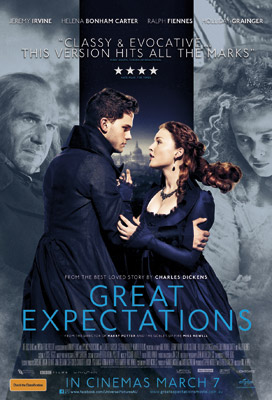
Great Expectations
Cast: Helena Bonham Carter, Ralph Fiennes, Robbie Coltrane, Jeremy Irvine, Holliday Grainger, Ewen Bremner, Jason Flemyng, Sally Hawkins, Tamzin Outhwaite, David Walliams, Jessie Cave, Olly Alexander, Ben Lloyd-Hughes, William EllisDirector: Mike Newell
Genre: Drama
Running Time: 128 minutes
Synopsis: Pip, a 10-year old orphan boy from a working class family, is surprised one winter's day by an escaped convict who demands food and tools to remove his chains. Terrified, Pip does as he's asked but the convict is ambushed and thrown back into his dreadful gaol, the prison ships that border the marshes by Pip's home.
A year later, Pip is employed by eccentric Miss Havisham, a local gentlewoman who has lived in seclusion since being abandoned at the altar 30 years ago and has never since seen daylight. Pip is to act as a companion to Miss Havisham's devastatingly beautiful 12-year-old ward, Estella. Pip falls in love with her and longs to become a gentleman in order to win her back when he's of age. It's a hopeless fantasy. The children part and Pip becomes an apprentice to his kindly brother-in-law Joe, the village blacksmith.
Ten years later, Pip, now a young man, receives the astonishing news that he has been given a huge fortune by an unnamed benefactor and is required to abandon Joe and his humble country life to be educated as a gentleman in London. Astonishingly, his childish hopes are fulfilled and he can now become the sophisticated young man he hoped to be during his childhood days with Estella.
But Great Expectations is a cruelly ironic title, as Pip's hopes founder on the discovery that his benefactor is none other than Abel Magwitch, the former convict he helped on the marshes all those years ago. Pip's money, his aspirations, and his sense of self are tainted by his connection to Magwitch, a violent criminal: and so Pip's story is set in motion and we watch his fate take him by the throat.
Release Date: March 7th, 2013
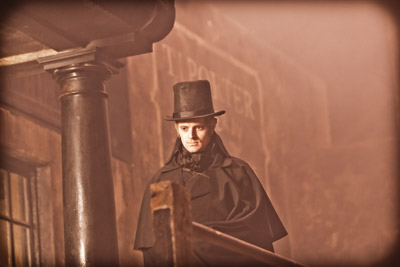
From Page To Screen
From its very first appearance in his weekly journal 'All The Year Round' in December 1860, Charles Dickens' Great Expectations has proved an enduring work. After boosting sales of the author's failing magazine to the 100,000 mark, Great Expectations was published in novel form in 1861, going into its fourth edition within weeks of its first printing.Even though the critics were far from united in their praise at the time, the novel - with its misguided hero, Pip, and a host of memorable supporting players, including the beautiful but loveless Estella, the enigmatic convict Magwitch, the unforgettable Miss Havisham and the sturdy Joe Gargery - has gone on to become the most widely read and universally lauded of all the writer's works.
It is therefore no surprise that Great Expectations has enjoyed a vibrant life on the screen. Filmmakers Elizabeth Karlsen and Stephen Woolley believe that it is time for the story to be told on the big screen once more. "There have been lots of fine television adaptations," Elizabeth Karlsen begins, "but a faithful screen adaption has not been done in over 60 years."
"Dickens is such a fine writer," she continues. "His books are an absolute pleasure to read and Great Expectations obviously is the classic and the greatest of them all. That novel still resonates clearly today with all its themes, children damaged by adults, people trying to pick up pieces of their lives after they've been damaged, people seeking revenge, being jilted, thinking you are someone and finding out you are someone else, people being discarded by society, notions of poverty, women being sold off as if in a cattle market or displayed in society like jewels. Class is still with us, even if it's in more insidious forms than in the 19th century."
To adapt the book for the screen the producers turned to author and screenwriter David Nicholls, with whom they had worked on When Did You Last See Your Father. "There's so much to the story, so to get a writer of David Nicholls' undoubted talent was absolutely vital," says Elizabeth Karlsen. The writer made his name with the screenplay for the TV series 'Cold Feet' and the novel and film Starter for Ten, before going on to adapt Tess of the D'Urbervilles for the BBC and to write the bestselling novel, and the screenplay, One Day. He says that Great Expectations is his favourite novel.
"When Elizabeth Karlsen and Stephen Woolley asked me about adapting Great Expectations I had just adapted Tess of the D'Urbervilles," says David Nicholls, "which was my first attempt at writing a script of a 19th century novel, and also another book that I love, so I was a little unsure to begin with. But then I took a deep breath and it has been wonderful, a great experience. I have really enjoyed it.
"It has always been my favourite book," he continues, "the one I have been back to time and time again. I have read it a million times and I have always loved it ever since I was about 13 years old. It is not a thing I'd have expected to adapt, though."
Returning to the book for the first time in a decade, David Nicholls was struck by the intricacy of the plotting and Dickens' skill as a mystery writer. "I hadn't read the book for about ten years when I was offered the job," he recalls, "and I took time to reread it and one thing that struck me was how brilliant the plot is. Pip in the last part of the novel becomes almost like a detective. I love the idea of Pip unravelling the truth."
David Nicholls says for all the novel's thematic complexity, "such a large part of the story is just about the struggles of a 19-year-old boy, trying to work out who he is and what he wants to be, and I think in condensing the action a little in the screenplay, we have added to that sense of it being a thriller and a mystery."
The writer's love of film noir was in the forefront of his mind when writing the script, "the idea of Miss Havisham holding the key, the idea of a femme fatale, the dark house that holds secrets. A lot of those ideas seem to me draw upon film noir, mystery and the gothic so I think there is a great deal of that in there but also I hope that we have clung onto the brilliant, sharp social satire."
After all Great Expectations is the supreme novel about class, aspiration and misguided ambition. "Pip's terrible desire to be a gentleman, without really knowing what that involves, what that means, I think is just brilliant writing," says David Nicholls. "It is a brilliant book in its analysis of snobbery and aspiration. I hope that is in the script as well."
When rereading the novel, however, David Nicholls was most taken with the power of the love story. "Writing romance is not Dickens' greatest strength," he notes, "but Estella is an extraordinary character and the relationship between Pip and Estella is incredibly touching and romantic and painful.
"I think the novel contains a really extraordinary piece of lyrical writing. I have never read the novel and not been moved by it so this was something that I wanted to draw upon in this version. I hope this version will be affecting and that it will have high emotion and drama and melancholy as well, at times."
It was the quality of David Nicholls' writing that immediately engaged the film's director Mike Newell, who counts on his impressive CV films as diverse as Four Weddings and a Funeral, Donnie Brasco, Harry Potter and the Goblet of Fire, Love in the Time of Cholera and Prince of Persia: The Sands of Time.
"What I loved most was that David Nicholls did one very ballsy thing, which was to tell the story from different points of view," says Mike Newell. "He told the story from several different points of view, not just Pip's. The way the story keeps refracting is something that David Nicholls had made a big feature of his adaptation.
"I loved constantly returning to the story and finding what you thought was true wasn't true at all," the director adds. "The main trick of the book is that the person who gives Pip his great expectations, who gives him the money and makes him a gentleman, is not the person that he thinks it is and the person he thinks that it should be.
"In fact, it is somebody who is not acceptable to him. It is a convict. That is a tremendous irony in the novel and the way that David has told this story from all these differing points of view allows you to build up an overall picture in the end. It is a wonderful bit of writing."
At the time of its publication, Great Expectations was seen as one of the writer's more joyful later novels though the modern-day reader may find it more melancholy. Certainly most critics believe it is a very personal novel. "For me it was one of the most personal of all his books," says Mike Newell, "and I think it is a book that in lots of ways is impregnated with all sorts of guilt. And I think that one of the questions that you can absolutely legitimately ask about the book is why is the leading character such a shit. And he is.
"Pip is treacherous, he will cast aside friends who have his best interests at heart. He will not see that his character is better suited to one of kind of life rather than to the life he aspires to and he rigorously refuses to listen to the people who would try to teach him otherwise. And he is absolutely horrible to the truest friend in his life, Joe Gargery, the blacksmith."
Mike Newell said that he found Pip's nature fascinating and was interested "in the sort of psychological insights that would have to go with that. Plus," he adds, "Dickens was writing this rip-roaring dramatic story, which is absolutely wonderful, but which at the same time is a portrait of two abused children, Pip and Estella."
And it is the adults who ought to have their best interests at heart that abuse them. "Estella is brought up by Miss Havisham to be cold and haughty and a heartbreaker and dreadful, while Pip is tempted by money to become what he is absolutely unfitted for, a gentleman," Mike Newell continues.
"He is no good at being a gentleman whatsoever. In fact he screws up himself and everybody around him by not listening to the people who try to tell him that, so both of those young people are horribly distorted by these adults' selfish ambitions."
Mike Newell also wanted the story to be full of passion. Like David Nicholls, he is excited by the love fostered between Pip and Estella, even though it burns but slowly in the latter. "I also think that there are lots of versions of this story, all of which I have seen and I can't say that any of them are very sexy," the director says.
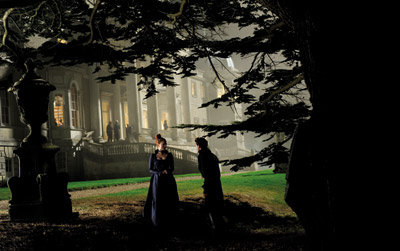 "Here we get a chance to ask: What does a young man feel about a young woman who he is absolutely head over heels in not only love but lust as well? And that side of the story is very rarely told."
"Here we get a chance to ask: What does a young man feel about a young woman who he is absolutely head over heels in not only love but lust as well? And that side of the story is very rarely told." Pip & Estella
When casting Great Expectations, Mike Newell says that he needed "actors who would dive into their characters as deeply as they were able to do, so you could absolutely believe how unlucky they were to have their stories woven together. I think our choices for who would play Pip and Estella were just terrific."
To play the role of Pip, the filmmakers turned to Jeremy Irvine, who earned praise last year for his leading performance in Steven Spielberg's WWI epic War Horse.
"Jeremy Irvine was terrific in his screen test," says producer Stephen Woolley, "and we needed the innocence of Pip, because in many ways Pip is quite naïve. But also we needed him to be desperate to succeed in his new role as a gentleman in society. We need to understand the motivation for that, which is to get the hand of Estella. You need him to be all these things, and also appealing, because the character could come across as repulsive. He's such a complex character and Jeremy Irvine is an actor who could bring all this complexity to the table."
Jeremy Irvine says that Pip is characterised by his ambition and drive. "It is quite easy to make Pip quite a passive character," the actor says, "but what David Nicholls has written is this incredibly ambitious and driven young man. This is someone who has been the victim of really horrendous physical and mental abuse growing up and he is horribly bullied in childhood. He has lost his parents."
Jeremy Irvine notes, therefore, that when Pip falls in love with Estella, "it is not just a childhood love it is this real burning desire; that this is the key to everything, a way of solving all his problems and getting out of the horrible circumstances that he is in. It isn't a comfortable telling of the story but a very violent and exciting sort of portrayal."
He adds, "It is a rollercoaster of a story but what also sets it apart in this adaptation is that you get a sense that the violence is real." Pip suffers terribly at the hands of his sister and guardian, Mrs Joe and his Uncle Pumblechook. "There is something very sinister and dark about that," Jeremy Irvine says.
For Pip, the character of Estella, whom he meets at Miss Havisham's haunting house, inspires a passion that burns his whole life, even in the face of Estella's seemingly cool response.
"It is not a done deal that Pip and Estella would ever get together," Jeremy Irvine says. "Even the way we have ended it, it's not a certainty, not at all. Especially if you go back to the social attitude of the time, the idea that someone like Pip would ever be with a character like Estella is almost ridiculous.
"But what it develops, which I was very keen to get across in my portrayal of Pip, is that this is someone who is knocked down time and again, every time he goes to visit Estella. Characters like Jaggers, Miss Havisham, Mrs. Joe, all these people keep knocking him down knocking him down and he develops this resilience. He is not a soft character at all. Our Pip is a very hard, strong maturing character."
David Nicholls adds, "Pip is desperate for the good opinion of people who are worthless, terrible people, but they are really not worth the time of day and that's his great lesson."
"He becomes decent but it is a long painful journey. Estella, meanwhile, I think, is one of the most compelling characters in Dickens. Both Estella and Pip have this common bond. They have been abandoned and suffered a type of abuse. They had terrible things done to them from a very early age and I think that bond between them is serious and compelling.
"Despite being cold and mean Estella underneath still has some vulnerability and potential to be a normal, functioning young woman."
To play Estella the filmmakers turned to young English actress Holliday Grainger. "Estella was adopted by Miss Havisham, who is a rich heiress who was jilted at the altar when she was younger," begins Holliday Grainger. "She was so absolutely heartbroken that in her anger she decided to wreak revenge on the male sex by bringing up a pretty young child to break men's hearts.
"So from a young age Estella had been taught how to wind men in and then break them. Also she was always taught not to fall in love because love always causes pain, so she has had the ability to love beaten out of her."
Holliday Grainger says that part of the novel's tragedy lies in that fact that Estella is capable of love "but she is just far too terrified of the idea of it, because she has always been told that it is going to hurt her. When she feels Pip's love she thinks she is not worthy or good enough for his love because she feels she wouldn't be able to give it back.
"I think the feelings she has for Pip are actually genuine because he is the only person who has ever shown her any affection. So when she warns him off it is almost a cry for help. She is kind of saying that, 'This is who I am and I can't break who I am so I don't want to hurt you.' I think that is what she is saying."
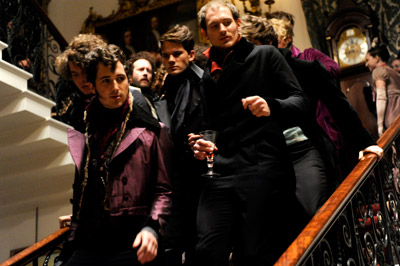 The actress studied the novel at school and at university - "I was actually writing an essay on Great Expectations when I got the call" - and says that the character of Estella has always intrigued her.
The actress studied the novel at school and at university - "I was actually writing an essay on Great Expectations when I got the call" - and says that the character of Estella has always intrigued her. "I kind of didn't get her and I hated her when I first read the book," says Holliday Grainger, "but the more re-readings of the novel I have done, the more I really feel for her. The older I get I feel sorry for her, how damaged she is. I know a lot of people think of her as being this cold coquettish, selfish, spoilt little girl but I have grown to see her as a victim of Miss Havisham's, and as being damaged and asking for help. I was really keen to do my version of her."
Great Expectations
Miss Havisham's influence steers the course of both Estella and Pip's lives, and when the latter is informed of his great expectations it is to Miss Havisham that he thinks he owes his thanks. He is appalled when he discovers that the terrifying convict, Magwitch, has paid for his good fortune and gentlemanly path. Magwitch is, undoubtedly, one of Dickens' most memorable characters.
"I am in awe of this vivid character with such a rich character, full of contradictions," says David Nicholls. "He is malicious and violent, brutish, powerful and by the end of the book he becomes a tragic figure, again a misused and abused man who can't escape his past."
Potential father figures abound in Great Expectations and all are flawed, "whether it is naïve and foolish and otherworldly Joe Gargery who wants to be Pip's father and whom he rejects, or Magwitch the brute who wants to look after Pip and wants to be his father and who is initially rejected. Those scenes between Joe and Pip and Magwitch and Pip are very much at the centre of our version of the story."
David Nicholls believes that the relationship between Magwitch and Pip is "one of the most touching things, not just in Dickens but in all literature, the way Pip goes from disgust and abhorrence for this awful, brutish, low figure to love and respect."
To bring this famous character to life, the filmmakers recruited two-time Oscar-nominee and BAFTA winning Ralph Fiennes, with whom Mike Newell worked on 2005's Harry Potter and the Goblet of Fire. "I had worked with Ralph Fiennes before and worked very happily," says Mike Newell. "He is very good at doing violence and I wanted Magwitch above everything else to be a truly violent man, and one that people would be frightened of."
Producer Elizabeth Karlsen points to Ralph Fiennes' performance as the Nazi officer Amon Goeth in Schindler's List. "Ralph Fiennes he is one of the greatest actors around," she says, "not many come close. Interestingly, when we decided to cast him most people were asking us whether he was playing the lawyer, Jaggers.
"The expectation is always that Magwitch is big and burly and working class; but Ralph Fiennes is sinewy and has a ferret-like, feral quality to him here. When you think of him in Schindler's List he is just terrifying."
Ralph Fiennes says that he was attracted to David Nicholls' screenplay. "I just thought it was a perfect combination of being true to Dickens' dialogue from the book but also editing it and adapting it so it had a filmic economy," says Ralph Fiennes. "The way that David Nicholl filleted out certain speeches from the original into the film script was just wonderfully done; it's a wonderful piece of editing and film writing. It was very faithful, as well, which I liked."
That the story is so enduring, Ralph Fiennes notes, is down in part to the dazzling array of recognisable characters that populate the story. "It is a rites of passage story for Pip, a young man, and it is so full of extraordinary, quite extreme characters so vividly described and also very recognisable," he notes.
"The peculiar men and women, all the unusual characters that Dickens creates are rooted in our own observations. You feel sometimes that these people are still around - that there are modern versions of Miss Havishams and Magwitchs. In fact, that is why Ethan Hawke and Robert De Niro's Great Expectations [directed by Cuarón] worked so well.
"There is a circularity too," adds Ralph Fiennes. "Dickens doesn't only write about families, but also pictures of separation, memories, forgotten loves, disappointments, disappointments of the heart. These are very recognizable in people and in their situations."
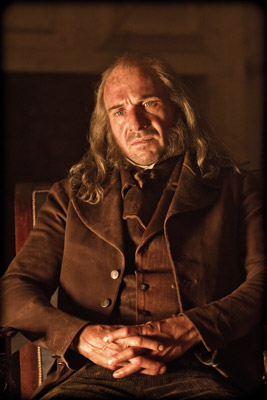 One of the most recognisable characters in all English literature is the inimitable Miss Havisham. "She is one of Dickens' supreme creations," coos David Nicholls. "In fact, she is perhaps one of the greatest feats of the imagination."
One of the most recognisable characters in all English literature is the inimitable Miss Havisham. "She is one of Dickens' supreme creations," coos David Nicholls. "In fact, she is perhaps one of the greatest feats of the imagination." Director Mike Newell says that he was keen to show how Miss Havisham's own expectations have damaged her life. "Her character is made by the moment at which time stopped," says Mike Newell. "She is dumped at twenty to nine in the morning as she is dressing for her marriage, as the story boldly states, and time stops and she is living in a time warp from then on.
"It is then a case of what that warp does to her," the director adds. "It is how the warp warps her and it is all done because of this huge expectation that she had of life - that she was in love and that she would have a future in front of her but that is all chopped back and what happens to her character is what happens to a person who is chopped down in that brutal fashion but does not die of it."
Highly acclaimed actress, BAFTA winning and two-time Oscar-nominee Helena Bonham Carter takes on the role. "I think Helena Bonham Carter did a brilliant job in showing how Miss Havisham changes during the course of the action," says producer Elizabeth Karlsen, "how she repents, how she becomes aware of the damage she has caused both to Pip and Estella."
Helena Bonham Carter says that she was excited by the combination of working with Mike Newell - "I love his films, he's a great storyteller, and I'd heard such great things about him" - and being asked to play Miss Havisham, who, she says, "is such an icon and such a great part."
"It's funny," she adds, "when Mike Newell e made the offer, it was quickly followed by him saying, 'Don't worry, if you look at the book she's not actually 78 years old!' She's probably only 37 when Pip meets her."
The filmmakers wanted to move away from the notion that Miss Havisham is an old crone, "which she isn't in the book," says David Nicholls. "She is not particularly aged. She is a lonely, tortured, anguished woman, troubled, and we wanted to get away from the idea of her being witchy and malicious and unchanging."
Helena Bonham Carter revelled in the role. "She is fascinating, this woman," the actress says. "Take away the age thing and there's still a lot going on with her. She's very, very ill, mentally, for a start,"
The actress says that she became "a real swot" when researching her role, speaking to several psychiatrists and experts on osteoporosis. "Miss Havisham has been inside for 15 years, so she would have had no vitamin D in her body," she notes, "and she'd have a had a failing eyesight. She is always asking Pip to come closer.
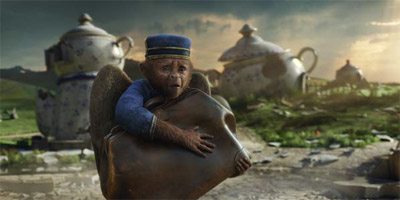 "I like all the illness, because when you play characters who are so damaged you really wonder what made them get to this point, what made them such a weirdo. Often if someone is truly damaged or hurt they have a bit of OCD, because they think that if everything is fine and they control their exterior then they'll never be hurt again.
"I like all the illness, because when you play characters who are so damaged you really wonder what made them get to this point, what made them such a weirdo. Often if someone is truly damaged or hurt they have a bit of OCD, because they think that if everything is fine and they control their exterior then they'll never be hurt again. "There are so many interesting sides to this character," Helena Bonham Carter concludes. "She is pathologically grief-struck, but is totally narcissistic. It's all about her - people do get their hearts broken and most people survive."
Someone who is definitely a survivor is the lawyer for Miss Havisham and Magwitch, the inscrutable Mr. Jaggers, played here by Robbie Coltrane, with whom Newell had worked on Harry Potter and the Goblet of Fire.
"I was very interested to work with Mike Newell again because he is one of my heroes, someone I hugely admire as we all do," Robbie Coltrane says. "Also I have never done Dickens and David Nicholls' adaptation of the story was absolutely wonderful. It is very, very difficult to get such a huge book into a film but he did an awfully good job."
Robbie Coltrane says that the Jaggers character is perennially interesting, a lawyer who counts all the most powerful figures in the story among his clients and yet who is largely unfathomable himself.
"Mike Newell and I had long talks about this, whether or not he was a good man or a bad man," says the actor. "Jaggers is a character who would do anything within the law when he is working for a client, but once he has stopped working for you he has no interest in you at all.
"He is very slightly detached about it. He treats clients like patients. It is just a job for him. There is no love between Pip and Jaggers despite the fact that he's such an important person in his life."
Producer Karlsen concludes, "Robbie Coltrane, Ralph Fiennes and Helena Bonham Carter are all terrific, as are Jeremy and Holliday. We have such a rich and wonderful set of actors."
The cast is rounded out by the likes of Jason Flemyng (Joe Gargery), Sally Hawkins (Mrs Joe), Ewen Bremner (Wemmick), David Walliams (Mr Pumblechook), Jessie Cave (Biddy), Olly Alexander (Herbert Pocket), Ben Lloyd-Hughes (Bentley Drummel), William Ellis (Compeyson) and Tamzin Outhwaite (Molly). Irvine's younger brother, Toby, plays Young Pip and is joined by Helena Barlow who plays the Young Estella, Cave's younger sister, Bebe, who plays Young Biddy and Charlie Callaghan who plays Young Herbert Pocket.
MORE
- Mission: Impossible Fallout
- Glenn Close The Wife
- Allison Chhorn Stanley's Mouth Interview
- Benicio Del Toro Sicario: Day of the Soldado
- Dame Judi Dench Tea With The Dames
- Sandra Bullock Ocean's 8
- Chris Pratt Jurassic World: Fallen Kingdom
- Claudia Sangiorgi Dalimore and Michelle Grace...
- Rachel McAdams Disobedience Interview
- Sebastián Lelio and Alessandro Nivola...
- Perri Cummings Trench Interview



